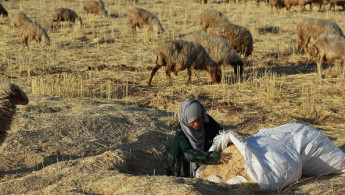Raqqa rations water amid major shortage in northeast Syria
The authorities in Raqqa province in northeastern Syria have issued an order that farmers ration water use as the area continues to suffer from a worsening water crisis.
The Civil Council of Raqqa imposed new restrictions on grain farmers in a statement on Saturday. The Council said that farmers growing maize, a key crop used for animal feed, have to limit themselves to only sowing 25 per cent of their arable land.
The Council added this decision was made as a result of the "low level of the Euphrates dam" and the inability of the council to provide sufficient irrigation for farmers.
Northeast Syria, historically Syria's breadbasket, has been suffering from a lack of water in recent years, impacting its agricultural sector and the living standard of its residents.
The Kurdish-led Autonomous Administration of North and East Syria (AANES), which controls the area, has continuously accused Turkey of weaponising water against it. Turkey is upstream of northeast Syria and controls key rivers, such as the Euphrates.
The country is one of the most active dam-builders in the world, and has constructed a series of dams in southeastern Turkey, mainly for electricity generation.
Ankara also views the AANES as an affiliate of the Kurdistan Workers' Party (PKK), listed as a "terrorist group" by the US and the EU and cast as an existential threat in Turkey. On 1 June, Turkish President Recep Tayep Erdogan announced his intention to launch his fourth military invasion of northeast Syria "to clear the area of terrorists."
According to the Syrian Democratic Forces (SDF), the military arm of the AANES, the average level of the Euphrates river was about 273 cubic meters per second in May. The UN had previously recorded the flow level of the Euphrates at below 200 cubic meters per second in 2020.
This is well below the minimum flow level of 500 cubic meters per second that was mandated in a 1987 treaty between Syria and Turkey.
The Euphrates river is a lifeline for northeast Syria, as it feeds a number of smaller rivers in the area. It is also the main source for the Tabqa dam, which provides electricity and water for the area. According to the SDF, the water level of the dam has dropped by about 36 percent in May.
The SDF also said that Turkish-backed forces in northeast Syria cut off water from the Alouk water station on nine different occasions during May. The Alouk water station is a water treatment plant that provides potable water for much of the population in northeast Syria.
It has been under the control of Turkish-backed forces since Turkey launched a military operation in northern Syria in October 2019.
Turkey denies that it is weaponising water or throttling the flow of the Euphrates to its downstream neighbours.
It has also accused Syria of not fulfilling its side of the 1987 treaty agreement which governs the cooperation of the Euphrates river. The same agreement mandated that Damascus not harbor any PKK members or allow the group to conduct operations in Turkey out of its territory.
"The accusations by the YPG [the main Kurdish militia in northeast Syria] in regards to the Alouk water station were mainly not true. The station needs electricity which was not provided by the YPG … and thus cuts were done," Ömer Özkizilcik, a foreign policy and security analyst based in Ankara, told The New Arab.
Özkizilcik added that the cuts to Alouk also affected Turkish-backed allies in northern Syria, and questioned why Turkey would want to negatively affect them.
"The accusations about the flow of the Euphrates River ignore climate change. Even inside Turkey, the water flow is lower than wanted," Özkizilcik said.
Northeast Syria is in the midst of its wheat harvest season, critical period for the entire country as food prices skyrocket.
The AANES Minister of Economy previously told The New Arab that this year's harvest is roughly expected to be the same as the year prior. The UN called last year's harvest "the lowest in fifty years."





 Follow the Middle East's top stories in English at The New Arab on Google News
Follow the Middle East's top stories in English at The New Arab on Google News


